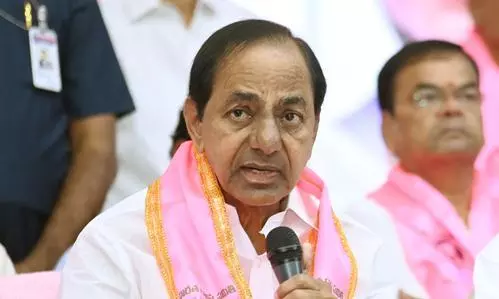Telangana HC hears KCR’s plea on power purchase, building power plants

Former Telangana Chief Minister K Chandrashekhar Rao. (Photo; DC)
Hyderabad: A Division Bench of Telangana High Court, comprising Chief Justice Alok Aradhe and Justice Anil Kumar Jukanti, heard the writ petition filed by former chief minister K. Chandrashekar Rao seeking a stay on the GO. Ms. No. 9 energy department order dated March 14, 2024, which constituted a One-Man Commission headed by former judge Justice L. Narasimha Reddy to investigate the procurement of power from Chhattisgarh by Telangana Discoms and the construction of the Bhadradri and Yadadri Thermal Power Plants during the BRS government.
The petition was listed before the Division Bench at the scrutiny stage as the Registry had raised an objection to naming Justice L. Narasimha Reddy (retd) as a respondent in a "personal capacity" in the petition filed by Chandrashekar Rao.Aditya Sondhi, senior counsel from Delhi, representing Chandrashekar Rao, argued that it was necessary to name Justice L. Narasimha Reddy as a respondent. He contended that Justice Reddy had concluded that the previous government committed irregularities causing a loss of `250 crore to `300 crore to the State Exchequer without providing Chandrashekar Rao the opportunity to present his contentions before the Commission. Additionally, he stated that Justice Reddy conducted a press conference explaining to the media before completing the inquiry, demonstrating bias.
Chief Justice Alok Aradhe questioned the impact of the report, suggesting that it could be discussed in the Assembly. Sondhi responded that holding a press conference was inappropriate and that the commission's duty was solely to submit the report to the government.
After these clarifications, the High Court overruled the Registry's objections, and the Division Bench proceeded to hear whether Chandrashekar Rao's petition should be admitted.
Continuing his arguments, Sondhi asserted that the order constituting the Enquiry Commission was without jurisdiction since the terms of reference were under adjudication by both the Telangana and Chhattisgarh State Electricity Regulatory Commissions. He argued that the Commission of Inquiry, as constituted under the Act, lacks jurisdiction to make findings on matters already adjudicated by a quasi-judicial authority.
Sondhi further contended that the notification was ultra vires because Paragraph 4 of the notification asked the Commission to fix responsibility for any lapses and financial implications, whereas the Enquiry Commissions Act only permits the Commission to submit a report and suggest recommendations. He cited the Supreme Court's ruling in Rama Krishna Dalmia Vs Justice S.R. Tendolkar to support his argument.
He also pointed out that Chandrashekar Rao was asked to file a reply before the Commission of Inquiry by June 15. However, Justice Reddy held a press conference on June 11, expressing opinions on Chandrashekar Rao's involvement before the reply could be submitted, indicating pre-judgment and bias in the inquiry process.
Despite a letter requesting Justice Reddy to recuse himself from the inquiry due to his pre-judged opinion, the Commission issued notices to Chandrashekar Rao under Section 8B of the Act, which Sondhi argued was a violation of the law as established by a Division Bench of Andhra Pradesh Court in K. Vijaya Bhaskar Reddy v. Government of Andhra Pradesh and upheld by the Supreme Court in Ghanshyam Upadhyay v. State of Uttar Pradesh.
The court adjourned the hearing to Friday, June 28, for the arguments of advocate general A. Sudharshan Reddy, who represents the State government and the Commission.
( Source : Deccan Chronicle )
Next Story

